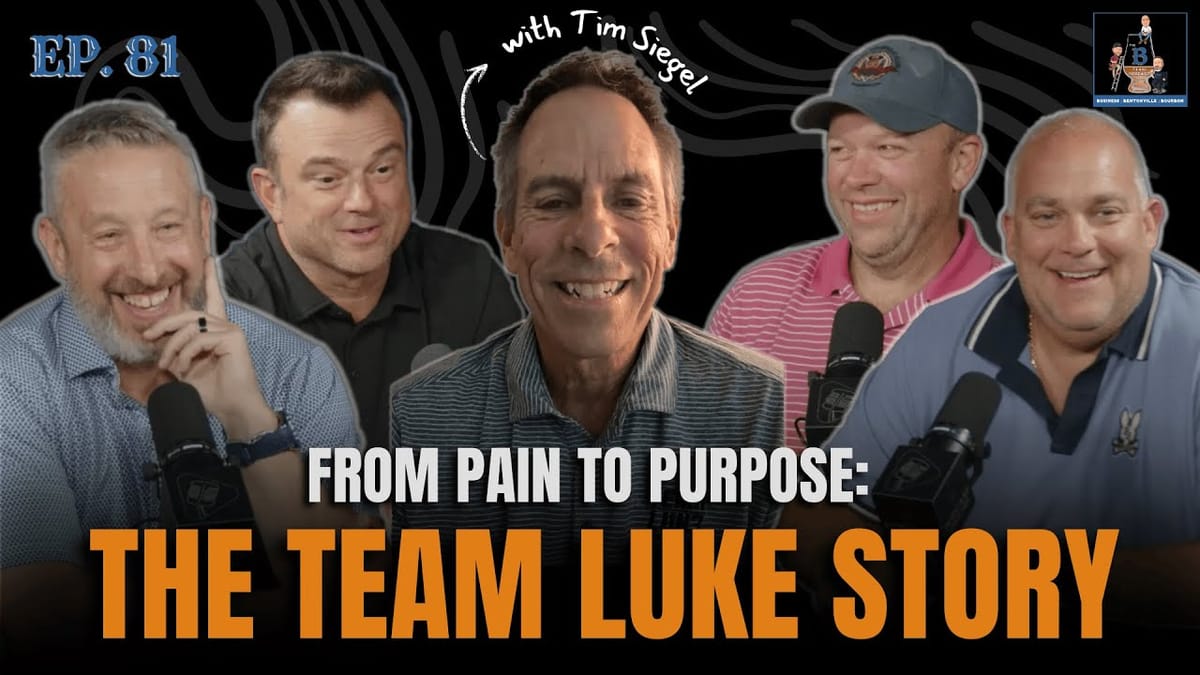How do you transform unimaginable grief into a legacy of hope? Tim Siegel's journey from professional tennis courts to hospital rooms to nationwide advocacy offers a profound answer.
After competing against tennis legends like John McEnroe and Ivan Lendl and coaching college tennis for 25 years, Tim made a pivotal decision in July 2015 to step down from his position at Texas Tech to spend more time with his children. Just twenty days later, his nine-year-old son Luke suffered a catastrophic brain injury in a golf cart accident.
"We were told Luke would never use his limbs, use his voice, or open his eyes," Tim shares with raw honesty. "But I always knew he would do more." For six years, Tim became Luke's primary caregiver, witnessing progress that defied medical expectations until Luke's passing from COVID in August 2021.
From this devastating loss emerged Team Luke Hope for Minds, a foundation that has granted over half a million dollars annually to families of children with brain injuries. The organization provides financial assistance, education, support groups, and an annual conference that brings families together from across the country.
What makes Tim's story even more remarkable is the widespread support from sports icons like Drew Brees, Patrick Mahomes, Andre Agassi, and many others who have rallied behind his cause. Through his foundation, podcast, books, and speaking engagements, Tim shares his "seven inspirations from Luke" that guide his mission: find your passion, don't ever quit, lean on friends and family, make good choices, be careful, have faith, find forgiveness, and let a loved one's legacy live on through you.
Visit teamlukehopeforminds.org to learn how you can support families affected by pediatric brain injuries and watch the documentary "Hope Beyond the Diagnosis" to see the foundation's impact firsthand.
More About this Episode
Title: Turning Tragedy Into Purpose: How Tim Siegel Is Saving Lives Through Team Luke Hope for Minds
When you think about how quickly life can change, it’s hard not to feel a little breathless. One moment you’re chasing your dreams, building your career, and spending time with your kids. Next, a single phone call can flip your entire world upside down.
For Tim Siegel, that moment came on July 28, 2015, when he received the call no parent ever wants: his nine-year-old son, Luke, had been in a golf cart accident. That call marked the beginning of a journey that would reshape not only his life but the lives of hundreds of families across the country.
What started as a personal tragedy has since evolved into Team Luke Hope for Minds, a nonprofit organization dedicated to supporting children with brain injuries and their families. Through financial assistance, emotional support, and national advocacy, Tim Siegel has turned the pain of losing his son into a powerful force for good.
Let’s unpack the extraordinary story behind Team Luke, the dangers of golf cart accidents, and how a grieving father found purpose in the unthinkable.
From Tennis to Team Luke: A Career Reimagined
Tim Siegel’s resume reads like a dream for any aspiring athlete. A former Razorback and professional tennis player, Tim competed in all four Grand Slams, including the US Open and Wimbledon, and was ranked in the top 100 in the world for doubles. He played against legends like John McEnroe and Ivan Lendl and shared the court with names like Jimmy Arias.
After retiring from professional play, Tim went on to a successful collegiate coaching career, leading the Texas Tech Red Raiders Men’s Tennis team for over two decades. His teams consistently ranked in the top 20, and he was widely respected in the world of collegiate athletics.
But in 2015, Tim made what many would consider an unusual career pivot. He resigned from Texas Tech and took a job coaching middle and high school tennis. His reason? He wanted to spend more time with his three kids: two daughters and his son, Luke.
Just 20 days later, the golf cart accident happened.
The Accident That Changed Everything
On that summer day in Lubbock, Texas, Luke was riding in a modified golf cart when it tipped over on a city street. He suffered a severe anoxic brain injury, meaning his brain was deprived of oxygen. Doctors gave a grim prognosis: Luke would likely never move, never speak, never open his eyes again.
But Tim wasn’t ready to give up.
He became Luke’s primary caregiver, taking on the role of night nurse, day nurse, and therapist, all at once. Over time, Luke began to respond to commands, moving his tongue, making sounds, and showing signs of awareness. The progress was slow, but it was there.
Then, in August of 2021, Luke contracted COVID-19. His fragile body couldn’t fight it. He passed away on August 19, six years after the accident that changed everything.
Creating a Legacy: Team Luke Hope for Minds
Shortly after the accident, Tim was encouraged to start a nonprofit. At first, he had no idea how. But his mission was clear: help other families dealing with pediatric brain injuries. He founded Team Luke and later merged with Hope for Minds, a like-minded organization based in Austin, Texas.
Since the merger in 2018, Team Luke Hope for Minds has grown into a national organization that provides:
- Financial assistance (up to $5,000 per family) for medical bills, therapies, and specialized equipment
- Emotional support, including online parent groups
- Educational resources for navigating care and recovery
- An annual conference in Austin that brings together families, doctors, and advocates
- Advocacy at the local and national level, including city councils and school districts
In 2024 alone, they’ve already helped over 50 families in just the past two months. Each year, they distribute more than $500,000 in grants, and the need is only growing.
A Network of Support: From NFL Stars to Tennis Legends
One of the most remarkable aspects of Team Luke’s growth has been the widespread support from the world of sports and entertainment.
- Drew Brees, the Hall of Fame quarterback, sent a video to Luke shortly after the accident and has remained actively involved.
- Patrick Mahomes, whom Luke idolized at Texas Tech, now wears a Team Luke bracelet during NFL games.
- Tennis legends like Andre Agassi, Andy Roddick, John Isner, and even Federer, Nadal, and Djokovic have all sent videos or participated in fundraisers.
- Elvis Andrus, a former Texas Rangers star, became a close family friend after sending Luke a video and later visiting him in the hospital.
These aren’t just one-off gestures; many of these athletes have shown up, year after year, raising awareness and funding for a cause that began with one child and a father who refused to give up hope.
The Silent Danger of Golf Carts and ATVs
Luke’s accident, and others like it, expose a deeply under-addressed issue: golf cart and ATV safety.
As Tim points out, he’s not anti-golf cart. He’s pro-safety. And the numbers speak for themselves. Every week, his nonprofit is contacted by one or two new families dealing with traumatic brain injuries resulting from golf carts or ATVs.
The dangers often come down to a false sense of security. These aren’t toys. They’re vehicles, often modified, heavier, and faster than parents realize. Without seatbelts or helmets, children are incredibly vulnerable.
If Luke had been wearing either that day, his life, and the lives of hundreds of families since, may have been very different.
“The Most Important Therapy Is Love”
Tim’s story is one of unimaginable grief, but also of relentless love.
He’s spoken to hundreds of families in the early stages of trauma. Families like the Matthews family in Northwest Arkansas, whose son Colin, a young tennis phenom, died in a similar golf cart accident. Tim doesn’t just offer them resources. He offers them empathy. Because he’s walked that road.
In his public speaking engagements, Tim shares seven inspirations drawn from his time with Luke:
- Find your passion
- Don’t ever quit
- Lean on friends and family
- Make good choices
- Be careful
- Have faith
- Let a loved one’s legacy live on through you
He emphasizes that love is the most powerful healing force, more than any therapy or treatment.
Forgiveness and Moving Forward
In perhaps the most poignant part of Tim’s journey, he shared that it wasn’t until six years after the accident that he was able to forgive the family who allowed Luke to ride in that golf cart, unsupervised and without safety equipment.
That forgiveness, he says, was freeing. It didn’t erase the pain, but it allowed him to let go of the bitterness that could have consumed him. It gave him clarity and the energy to keep going, for Luke, for his daughters, and for the thousands of children out there who still need help.
How You Can Support Team Luke Hope for Minds
Whether you’re a parent, coach, educator, or just someone who wants to make a difference, there are several ways to support Tim Siegel’s mission:
- Visit https://teamlukehopeforminds.org/ to donate, get involved, or apply for assistance
- Watch the YouTube documentary Hope Beyond the Diagnosis
- Share their story on social media to spread awareness
- Invite Tim to speak at schools, sports programs, or corporate events
- Attend or sponsor fundraising events, including those held in Lubbock, Austin, and Northwest Arkansas
Tim also hosts a podcast called Tuesdays with Tim, where he interviews parents, medical professionals, and advocates in the world of pediatric brain injury. It’s a powerful platform for education and empathy.
Final Thoughts
Tim Siegel will be the first to tell you he never wanted to be in this position. He didn’t want to be a grief expert, or a nonprofit founder, or a public speaker on traumatic brain injuries. He just wanted to be a dad.
But in the face of overwhelming loss, he’s created something remarkable, a legacy for his son that’s saving lives, building community, and offering hope to the hopeless.
If Luke’s accident had never happened, Team Luke Hope for Minds wouldn’t exist. But because it does, hundreds of families facing the darkest moment of their lives now have someone to walk with them, guide them, and remind them they’re not alone.
And that’s a legacy that’s hard to measure in dollars, but impossible to ignore.


Member discussion: